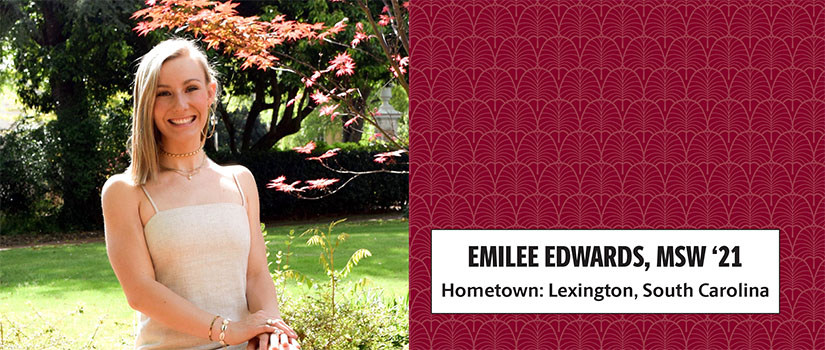Aug. 18, 2020
Chris Woodley • cwoodley@mailbox.sc.edu
Students at primary and secondary public schools have typical daily needs in the classroom that are handled by teachers. But school social workers are needed for community resources or when external issues arise that may inhibit students’ academic success. One Master of Social Work Advanced Standing student was initially on a path to becoming a teacher. But personal experiences helped her realize she could work in schools and still help students, even if she were not in the classroom.
From a young age, Emilee Edwards always knew she wanted to pursue a career in education. She first began her undergraduate studies as an elementary education major at Anderson University. But seeing the advantages she had attending River Bluff High School in Lexington, South Carolina and working with disadvantaged students in the classroom had a significant impact on Edwards decision to transfer to the University of South Carolina to study social work.
“I attended an affluent, nationally acclaimed public school with plasma screens in each classroom, state of the art facilities, and a one-to-one ratio for technology,” Edwards says. “That put a bad taste in my mouth because I felt a sense of privilege as other students in my community and around the state did not have access to those same resources.
I started asking myself, 'Why do I deserve these advantages, but other students do not?' I discovered that it wasn’t a matter of deserving but of unequally distributed resources within our society.”
During her sophomore year at Anderson, Edwards interned at a local school district and tutored students who had experienced homelessness. While she enjoyed the opportunity to work with children in the classroom, her experience helped her recognize that she could help students in more ways than just understanding the curriculum.
“I felt that I wasn't able to serve in the capacity I wanted to in a classroom setting,” Edwards says. “I realized I was meant to provide fundamental resources for children that were critical to the success in the classroom and beyond. It became a matter of not being interested in curriculum and instead wanting to provide physiological resources for kids, which led me to social work.”
When Edwards learned that schools have social workers, she jumped at the opportunity to follow a new career path. She transferred to the UofSC College of Social Work prior to her junior year to study social work. The transition from elementary education to social work was not difficult, and she graduated with her Bachelor of Social Work degree this past May. Edwards began the 11-month MSW Advanced Standing Program shortly after graduating and was forced to complete her summer semester in virtual classrooms, which is also how she completed her undergraduate studies due to COVID-19.
“I had an online class at Anderson, which gave me an understanding of virtual classrooms,” Edwards says. “My BSW and MSW professors have done such a good job, and I’m thankful for their efforts to make this a seamless transition. It felt weird not being in the classroom during the summer, but the professors did an outstanding job of making it feel as close to being in-person as possible.”
The start of the fall semester will not only resume in-person classes but also begin Edwards field placement at Lexington Richland School District 5. In addition to meeting new students and colleagues, she is excited to build on her BSW experiences, which included a field placement at Richland School District 2.
“I have a good foundation and look forward to taking my next step toward becoming a professional,” Edwards says. “I had no experience with social work when I interned at a school as an education major. In the BSW program, I was able to learn the basics and formalities of social work, and now I feel ready to get the ball rolling and really dive into practice.”
In addition to her first experience working at a school, Edwards believes her previous volunteer work helped set the tone for eventually pursing a social work career. She advocated for various causes in high school and volunteered at a local non-profit, the LOT Project, while attending Anderson. Her experiences at the LOT Project helped her recognize the needs of some of the most vulnerable populations.
“The LOT Project provided free meals, clothes, hygiene products and shoes, but it was also a space to build genuine relationships with people in the community,” Edwards says. “From the connections I was making, I began seeing people’s needs, homelessness and poverty in a new light. I strongly encourage social workers to volunteer and be involved in community events. We’re not only responsible for our jobs but to also be an advocate beyond our professional expectations.”
Previously, Edwards did not realize social workers were at schools. But now, she understands just how crucial their roles are within schools. She describes social workers at schools and other organizations as the behind-the-scenes employees who are passionate about making a difference and creating positive change.
”People in the social work field have a common heart and sense of humility,” Edwards says. “Describing a social worker is hard because they have different functions depending on their role. But they are always humble, kind and striving to make a difference while working towards the greater good.”
